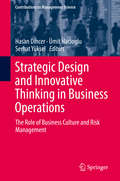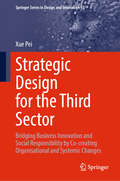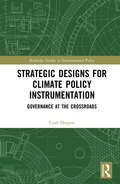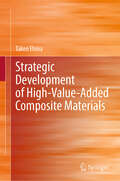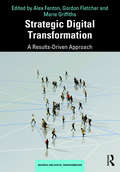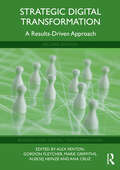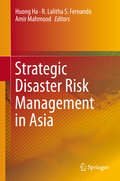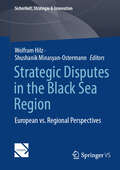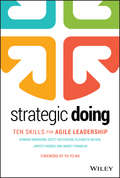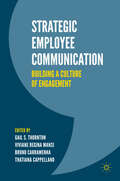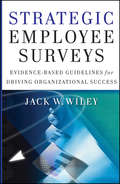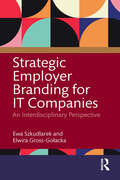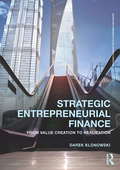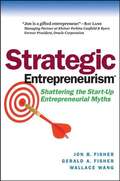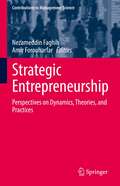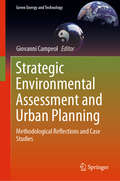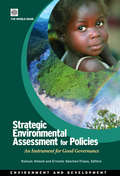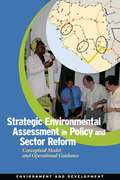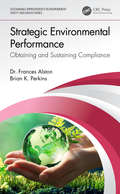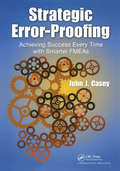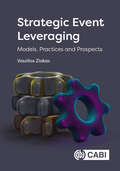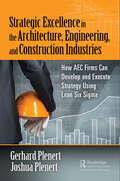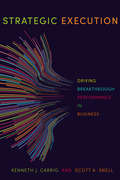- Table View
- List View
Strategic Design and Innovative Thinking in Business Operations: The Role of Business Culture and Risk Management (Contributions To Management Science)
by Hasan Dincer Ümit Hacioglu Serhat YükselRecently, rapid technological advances have been influencing the global business operations strategies at companies of all sizes like never before. At the same time, there has been a shift in business cultures due to the rising prevalence of matrix organizations and innovative thinking. This book investigates the role of these factors in shaping the business operations of tomorrow. To address the topic comprehensively, the editors have gathered expert contributions exploring the following dimensions: the business and organizational environment, strategic design, innovativeness and risk management. Discussing aspects ranging from customer selection to understanding regional, national and supranational market dynamics, the contributions will help readers understand both the complexity of and opportunities presented by designing operations.
Strategic Design for the Third Sector: Bridging Business Innovation and Social Responsibility by Co-creating Organisational and Systemic Changes (Springer Series in Design and Innovation #55)
by Xue PeiThis book discovers and demonstrates the strategic values of design within the context of the third sector, a domain characterized by inherent complexity and the objective of effecting positive transformations across both economic and social dimensions. Based on seven years of research, it combines theoretical insights with hands-on empirical studies, offering a compelling narrative on the evolving roles of strategic design in third sector organisations. Through an in-depth analysis of best practices and four action research projects, the book showcases how design enables third sector organisations to uncover opportunities, manage innovation processes, and facilitate meaningful collaboration among diverse stakeholders. At its core, it introduces a design framework to illustrate how a strategic design mindset, together with methods and tools, fosters stakeholder participation and co-creation in the innovation process, and how it inspires conversations and reflections on organizational and systemic changes. The framework also offers actionable strategies for design researchers and practitioners willing to apply strategic design for addressing complex societal problems through creativity, innovation strategy and a systemic lens.
Strategic Designs for Climate Policy Instrumentation: Governance at the Crossroads (Routledge Studies in Environmental Policy)
by Gjalt HuppesThis book provides insight into the development of effective climate policy instrumentation in two divergent and mutually exclusive directions. Examining the role of political philosophies, the book explains why current climate policy is ineffective and unable to halt rapidly rising atmospheric concentrations of CO2, and suggests strategies for ending the current stalemate in climate governance. Drawing on examples from real-world case studies and challenges, the author first sets out an instrumentation approach based on a command and control strategy which involves identifying the technologies and behavior key to meeting the required emissions reductions, such as energy efficient homes and zero-emission cars. The second strategy concerns institutional rearrangement, creating incentives and options which will allow for decentralized climate action. This approach would transform and strengthen current emission trading systems, such as the EU ETS, into a price stabilized system covering all fossil fuels, and ultimately as an emission tax, as well as creating an open electricity market. These approaches not only highlight that fundamental changes in climate policy instrumentation are now vital, but that consistent strategies such as those laid out by the author are necessary if we are to avoid costly and ineffective alternatives. Exploring key issues such as the relationship between instrumentation and broader political philosophy, as well as applying a systems oriented design methodology for effective instrumentation, this book will be of great relevance to scholars and policy makers with an interest in climate change and environmental politics.
Strategic Development of High-Value-Added Composite Materials
by Takeo EbinaThis book provides detailed descriptions of material design, from the development of new materials and innovation to the promotion of social acceptance of the products invented. After developing a clay-based film and applying for many related patents, the author engaged in consortium-based development, where different companies simultaneously developed multiple products using the raw material. Throughout this process, the author discovered that developing high-value-added products using new materials requires extensive time and cooperation among various stakeholders. The author coined the term "integrated development" to describe this collaborative approach. This book serves as a guide to the integrated development, presenting numerous examples and generalizations to enable readers to practice integrated development. This book is aimed at material experts, development leaders in companies, research institutes, and support organizations. The most important skills for each stage of development are organized into chapters in sequential order. However, each chapter is independent, allowing readers to focus on the specific chapter they need. The knowledge presented in this book can be utilized to design new materials required across various industries. The English translation of this book from its Japanese original manuscript was done with the help of artificial intelligence. A subsequent human revision of the content was done by the author.
Strategic Digital Transformation: A Results-Driven Approach (Business and Digital Transformation)
by Gordon Fletcher Marie Griffiths Alex FentonEmerging technologies are having a profound impact upon business as individuals and organisations increasingly embrace the benefits of the ‘always on’ attitude that digital technologies produce. The use of the web, apps, cloud storage, GPS and Internet-connected devices has transformed the way we live, learn, play and interact – yet how a business can fully benefit from this transformation is not always clear. In response, this book enables students and business leaders to take a strategic and sustainable approach to realising the value of digital technologies. It offers results-driven solutions that successfully transform organisations into data-driven, people-focused businesses capable of sustainably competing at a global level. Split across four key parts, the material moves through understanding digital business to planning, implementing and assessing digital transformation. The current challenges facing all small organisations, including limited resources, financial pressures and the lack of dedicated IT departments, are explored. The authors consider the ways in which innovation can increase competitive advantage, how innovative business models can create new opportunities and how a data-driven perspective can release embedded value within the organisation. Contemporary international case studies and examples throughout each chapter bridge theory with practical application and systematically document the patterns of activities that enable success. This textbook is a vital resource for postgraduate and undergraduate students of digital business, innovation and transformation. By showing how to initiate digital transformation across an organisation, it will prepare business owners, directors and management of small- and medium-sized businesses to take strategic advantage of new and emerging technologies to stay ahead of their competition.
Strategic Digital Transformation: A Results-Driven Approach (Business and Digital Transformation)
by Alex FentonEmerging technologies are having a profound impact upon individuals and organisations. The “always on” attitude that digital technologies encourage brings an equal mix of benefits and challenges. The ready availability of digital technology has transformed the way we live, learn, play and interact – but how a business can turn the tools into an economic and organisational advantage is not always clear.This new edition of Strategic Digital Transformation enables students and business leaders to take a strategic and sustainable approach to realising the value of digital technologies. It offers results-driven solutions that successfully transform organisations into data-driven, people-focused businesses capable of sustainably competing at a global level. These solutions are significantly shaped by the need for organisational digital maturity, high levels of digital and cultural interoperability and the purposeful application of AI. With four key areas of focus, the material moves through understanding digital business to planning, implementing and assessing digital transformation. The current challenges facing all small organisations, including limited resources, financial pressures and the lack of dedicated IT departments, are explored. The authors consider the ways in which innovation can increase competitive advantage, how innovative business models can create new opportunities and how a data-driven perspective can release embedded value within the organisation. Contemporary international case studies and examples throughout each chapter bridge theory with practical application and systematically document the patterns of activities that enable success. All chapters have been completely revised and updated to reflect advances in technology and to highlight the social and economic consequences of digital transformation.This textbook is a vital resource for postgraduate and undergraduate students of digital business, innovation and transformation. By showing how to initiate digital transformation across an organisation, it will prepare business owners, directors and management of small- and medium-sized businesses to take strategic advantage of new and emerging technologies to stay ahead of their competition.
Strategic Disaster Risk Management in Asia
by Huong Ha R. Lalitha S. Fernando Amir MahmoodThis book presents strategies for managing disasters and reducing risks in Asian countries. Given the dynamic changes in the natural environment as well as the patterns of land use and management, the growing populations of the developing nations in Asia, migration patterns, and other social-cultural aspects, the impacts of disasters have increased manifold in Asian countries. Against this backdrop, the book examines disaster management issues such as disaster preparedness, post-disaster reconstruction, peace, development and corruption. The views of different groups of stakeholders are incorporated in the discussion to ensure a comprehensive analysis of and findings on the governance process, as well as best practices in pre- and post-disaster management. The book also includes chapters focusing on aspects often overlooked in the context of disaster management, such as the need to invest in public education to improve public awareness, and approaches to supporting the disabled, the vulnerable and the elderly from disaster risks. In closing, the book presents research on disaster management methods employed by different countries in the Asian region. Acknowledgement: The editors acknowledge the role of the Network of Asia Pacific Schools and Institutes of Public Administration and Governance (NAPSIPAG), which is the largest governance research network in the Asia Pacific region,in bringing out this book. NAPSIPAG has been regularly organizing international meetings of administrators, academia and non-state bodies to provide a forum to the regional scholars to deliberate with the international governance experts. It has also helped the international policy organizations to have a better understanding about the region through a local lens of Asiatic anthropology, ethnography and culture of administration.
Strategic Disputes in the Black Sea Region: European vs. Regional Perspectives (Sicherheit, Strategie & Innovation)
by Wolfram Hilz Shushanik Minasyan-OstermannThe Black Sea region has undergone significant political and social transformations over the past few decades, resulting in a new geopolitical reality that demands scholarly attention. This book offers a comprehensive analysis of the evolving security dynamics and the associated narratives in this strategic area. With a particular focus on the interplay between European and regional perspectives, this volume explores the critical role of power, energy policy, and security interests in shaping the region's geopolitical landscape. It examines the resurgence of regional leading powers, notably Russia, which has pursued a militant and aggressive foreign policy to reclaim its dominant position. The ongoing conflict between Russia and Ukraine has had a profound impact on the Black Sea region, leading to political and social crises in reform-oriented states like Armenia, Georgia, and Ukraine. Moreover, this book delves into Turkey's shifting role in the Black Sea region, as it reevaluates its strategic position between Asia and Europe. The authors analyze Turkey's transition from a cautious and dialogue-oriented regional policy to a more offensive and aggressive foreign policy profile. By considering diverse perspectives, the volume evaluates the prospects for an effective EU foreign policy in the region, examines the potential for sustainable democratic transformation, and explores the growing militarization of Turkish and Russian foreign policies. It also sheds light on the challenges and opportunities for strengthening pluralistic systems in the afflicted states. Featuring contributions from leading scholars in international security studies and foreign policy, this book offers a timely and in-depth exploration of the Black Sea region's complex dynamics. It will be an indispensable resource for scholars and policymakers seeking to understand the strategic disputes and their implications for European and regional interests.
Strategic Doing: Ten Skills for Agile Leadership
by Edward Morrison Scott Hutcheson Elizabeth Nilsen Janyce Fadden Nancy FranklinTen skills for agile leadership Complex challenges are all around us—they impact our companies, our communities, and our planet. This complexity and the emergence of networks is changing the practice of strategic management. Today’s leaders need to understand how to design and guide complex collaborations to accelerate innovation and change—collaborations that cross boundaries both inside and outside organizations. Strategic Doing introduces you to the new disciplines of agile strategy and collaborative leadership. You’ll learn how to design and guide complex collaborations by following a discipline of simple rules that you won’t find anywhere else. • Unleash the power of true collaboration • Learn and master the 10 skills of agile leadership • Apply individual skills to targeted situations • Introduces a new discipline of leadership strategy Filled with compelling case studies, Strategic Doing outlines a new discipline of leadership strategy specifically designed for open, loosely-connected networks.
Strategic Employee Communication: Building a Culture of Engagement
by Gail S. Thornton Viviane Regina Mansi Bruno Carramenha Thatiana CappellanoEmployee engagement (or a lack thereof) can often be linked to poor communication and a detachment from company goals. Companies of all sizes are looking for ways to boost communication, recognizing its impact on key business outcomes, such as productivity and profitability. This book offers fresh insights about opportunities to improve the quality of employee communications based on employees’ needs. It highlights the importance of simple, jargon-free communication that focuses on dialogue and content. High-performing organizations are more likely to think about communication from the audience perspective, rather than purely from the management perspective. The case studies offer readers a firm understanding of ways to implement and measure communication in daily practice. Effective communication requires planning and this book, with its focus on the US, Latin America, and emerging markets, will guide readers in using communication in the alignment of corporate and employee needs.
Strategic Employee Surveys
by Jack WileyIn part one of the book, readers receive specific examples of how to measure safety, ethics, union vulnerability, work life balance, diversity, the drivers of employee retention and employee engagement, as well as examples of survey content needed to best predict business success. With each type of survey content, also provided will be the most recent normative results, helpful for placing results from any organization into the proper interpretative context. A reader of this book could literally design their own survey, and have confidence the survey would effectively measure their strategic purpose.In part two, readers are provided with specific guidance on the other key component of ensuring employee survey program success: survey feedback and action planning processes. Wiley outlines a time-tested seven-step model of survey feedback and action planning, explaining each step of the model and through real-life client examples, identifying the most common pitfalls of the overall process. Readers will thus know how to navigate around these potential problems and will receive advice on how to set goals for improvement from one survey measurement to the next. This will include a review of specific goal-setting techniques. Finally, the characteristics of leadership teams whose organizations achieve sustained improvement over multiple iterations of survey measurement are identified and discussed.Table of Contents:Chapter 1: IntroductionChapter 2: Employee Surveys as Warning IndicatorsChapter 3: Employee Surveys as Program Evaluation MeasuresChapter 4: Employee Surveys to Measure Employer of ChoiceChapter 5: Employee Surveys as Leading IndicatorsChapter 6: Merging "Employer of Choice" and "Leading Indicator" Survey PurposesChapter 7: An Overview of Survey Feedback and Action PlanningChapter 8: Setting Goals for Improvements in Survey ResultsChapter 9: Sustaining ChangeChapter 10: Final Thoughts
Strategic Employer Branding for IT Companies: An Interdisciplinary Perspective
by Elwira Gross-Gołacka Ewa SzkudlarekWith the rise of a knowledge-based economy a change in the approach to the role of employees has come. This emphasised the pivotal role of human capital in business success, leading to a "war for talent," compelling organisations to enhance efforts to attract top talent. Employer branding has thus grown in significance. Initially rooted in human resources management, employer branding now incorporates interdisciplinary approaches combining brand, image, reputation and its impact on competitive advantage and strategic goals. Employers are increasingly viewing employer branding as crucial for attracting talent.Marked by a talent shortage, the IT industry is emblematic of employer branding’s importance as it faces unique challenges, which include the lengthy and costly process of training IT professionals and the globalised labour market driven by remote work. The COVID-19 pandemic further reshaped labour market dynamics, intensifying the need for effective employer branding.Strategic Employer Branding for IT Companies: An Interdisciplinary Perspective focuses on both theoretical analyses and practical tools for effective employer branding. The book proposes an interdisciplinary approach in a strategic context, addressing employer branding’s role in competitive advantage. The book: Reviews definitions and models of employer branding Identifies interdisciplinary areas supporting employer branding strategies Presents a model for a strategic approach to employer branding Analyses in global terms the IT sector in Poland as a case Provides practices, recommendations and tools for employer branding The book’s highlight is a proprietary employer branding model for the IT industry. Bridging theory and practice, this model offers valuable insights for international stakeholders,enriching academic literature and supporting strategic employer branding implementation. This book is a contemporary guide for researchers, practitioners and students on how to develop robust employer branding strategies.
Strategic Engagement in Global S&T: Opportunities for Defense Research
by Committee on Globalization of Science Technology Opportunities Challenges for the Department of DefenseAccording to recent reports, the United States currently accounts for less than one-third of global research and development spending, and it is projected that this fraction will decline to 18% by 2050. These statistics, compounded by the recognition that the United States no longer maintains technological superiority across all research fields, highlight the need for the U. S. research community to stay abreast of emerging science and technology (S&T) around the world, to leverage others' investments, and to seek out collaborations in areas where researchers need to remain at the leading edge. The United States' Department of Defense (DoD) has long relied on its historical technological superiority to maintain military advantage. However, as the U. S. share of S&T output shrinks and as the U. S. defense research enterprise struggles to keep pace with the expanding challenges of the evolving security environment and the increased speed and cost of global technology development, the DoD must reexamine its strategy for maintaining awareness of emerging S&T developments occurring around the world. To fully leverage these advances and to make strategic research investments, the DoD must assess with whom and in which areas it should collaborate. To delve more deeply into the implications of the globalization of S&T and of international S&T engagement for the DoD, the Office of Naval Research, the Air Force Office of Scientific Research , and the Office of the Deputy Assistant Secretary of the Army for Research and Technology asked the National Research Council to assess current DoD strategies in the three Services - Army, Air Force, and Navy - for leveraging global S&T and for implementing and coordinating these strategies across the department. Strategic Engagement in Global S&T assesses the opportunities and challenges stemming from the globalization of S&T and the implications for the DoD and its Services. This report considers DoD strategies in the three Services for leveraging global S&T and implementation and coordination of these strategies across DoD. The report explores models for global S&T engagement utilized by other domestic and foreign organizations. Strategic Engagement in Global S&T assesses how the ongoing globalization of S&T may impact research funding and priorities and workforce needs, as well as issues of building and maintaining trusted relationships and avoiding technology surprises. This report will be of interest to researchers and industry professionals with expertise in the globalization of science and technology, international engagement, the defense research enterprise, program evaluation, and national security.
Strategic Entrepreneurial Finance: From Value Creation to Realization (Routledge Advanced Texts in Economics and Finance)
by Darek KlonowskiEntrepreneurial finance is a discipline that studies financial resource mobilization, resource allocation, risk moderation, optimization in financial contracting, value creation, and value monetization within the context of entrepreneurship.? However, without proper strategic consideration the discipline is incomplete. This book examines how the activity of entrepreneurial finance can be enhanced via a concentration on value creation and through improved strategic decision-making. The most unique feature of the book is its focus on value creation. For entrepreneurs, value creation is not a one-off activity, but rather a continuous cycle of incremental improvements across a wide range of business activities.? Entrepreneurial value creation is described in four comprehensive stages: value creation, value measurement, value enhancement, and value realization, referred to as the C-MER model. This book focuses on what creates value rather than merely presenting value creation in a straight accounting framework. At the same time, deliberate and tactical planning and implementation ensure that the firm does not ignore the components necessary for it to survive and flourish.Vigorous strategic deliberations maximize the entrepreneurial firm’s chances of making the right business decisions for the future, enable the firm to manage its available financial and non-financial resources in the most optimal manner, ensure that the necessary capital is secured to progress the development of the firm to its desired development level, and build value. While financial considerations are important, the field of strategic entrepreneurial finance represents a fusion of three disciplines: strategic management, financial management, and entrepreneurship. This orientation represents a natural evolution of scholarship to combine specific domains and paradigms of naturally connected business disciplines and reflects the need to simultaneously examine business topics from different perspectives which may better encapsulate actual entrepreneurial practices.
Strategic Entrepreneurism: Shattering the Start-up Entrepreneurial Myths
by Jon B. Fisher Gerald A. Fisher Wallace WangThe dream of nearly every entrepreneur is to create the next big-name success story like Dell Computers or Google. While it is nice to dream big, the reality is that most startups fail precisely because they're trying to become the next big-name success. The real secret to entrepreneurial success lies in Strategic Entrepreneurism, where you design a company specifically to be acquired by a larger one. A thorough understanding of this concept is crucial in our modern economic environment with its focus on technological efficiency and its plethora of highly acquisitive organizations.
Strategic Entrepreneurship: Perspectives on Dynamics, Theories, and Practices (Contributions to Management Science)
by Nezameddin Faghih Amir ForouharfarThe result of the application of strategic management philosophy to the nexus of entrepreneurship, innovation, and economy, strategic entrepreneurship fosters sustainable development and competitiveness. This volume provides an introduction to the theories of strategic entrepreneurship and accounts of their real-world applications in the entrepreneurial sector. The book is divided into three parts. Chapters in Part I discuss strategic entrepreneurship dynamics and mechanisms. Chapters in Part II focus on strategic entrepreneurship concepts and theories. Chapters in Part III provide global examples of strategic entrepreneurship practices in action. Presenting a view of strategic entrepreneurship across diverse sectors and industries, this edited volume will be attractive to researchers and students interested in management, entrepreneurship, economics, public administration, and public policy, as well as corporate strategists, managers, and policymakers looking to integrate the principles of strategic entrepreneurship.
Strategic Environmental Assessment and Urban Planning: Methodological Reflections and Case Studies (Green Energy and Technology)
by Giovanni CampeolThis volume gathers a selection of research contributions on Strategic Environmental Assessment (SEA), including theoretical and methodological studies and real-world case studies. It sheds new light on the respective steps in the procedure defined in the SEA Directive from theoretical and operational standpoints, intended to enhance the sustainability of plans and programmes adopted by local, regional and national authorities. Improving the legitimacy and transparency of decision-making in the field of environmental management was one of the goals that led the European Commission (EU) to adopt Directive 2001/42/EC on the assessment of environmental programmes’ effects. This book provides a multidisciplinary approach to SEA, and addresses the demand for policies and strategies to strengthen resilience through concrete measures to reduce energy consumption, mitigate pollution, promote social inclusion and create urban identity.
Strategic Environmental Assessment for Policies
by Kulsum Ahmed Ernesto Sanchez-TrianaEnvironmentally and socially sustainable policies are essential for good governance. Strategic Environmental Assessment (SEA) is the key tool for integrating environmental considerations into policies, programs and plans. This book focuses on SEA applied to policies. Through lessons learned from previous use of SEA on policies, it draws lessons on the strengths and weaknesses of current SEA methodology. It then goes on to analyze how policies are formulated and implemented and proposes a new conceptual framework for conducting SEA of policies thatpotentially could be more useful in influencing decision makers to integrate environmental sustainability considerations into policy formulation and implementation.
Strategic Environmental Assessment in Policy and Sector Reform
by World Bank The University of Gothenburg The Netherlands Commission for Environmental Assessment Swedish University of Agricultural SciencesThis book presents the findings and recommendations of the evaluation of the World Bank's Strategic Environmental Assessment (SEA) Pilot Program. It shows that SEA can contribute to improving development policy and sector reform by calling attention to environmental and social priorities, strengthening constituencies, enhancing policy capacities, and improving social accountability. It also provides guidance for undertaking SEA in policy and sector reform. Although it acknowledges the need for tailoring SEA to the context of specific sectors and countries, the book discusses in detail-and illustrates with examples-the analytical work and participatory processes required for effective SEA at the policy level. It suggests that the time is ripe for scaling up SEA in development policy and sector reform and recommends the establishment of a global alliance on environmental and climate change mainstreaming to support developing countries' efforts for achieving sustainable development. The book concludes by arguing that SEA applied to sector reform and development policy is a critical step for these efforts to be successful. This title responds to demand for SEA approaches at the policy level from policymakers, development and environmental specialists of bilateral and multilateral institutions, and environmental assessment specialists. This publication is the result of joint work by the Environment Department of the World Bank, the Environmental Economics Unit at the Department of Economics of the University of Gothenburg (EEU), the Swedish EIA Centre at the Swedish University of Agricultural Sciences, and the Netherlands Commission for Environmental Assessment (NCEA.) In line with the Paris Declaration on Aid Effectiveness, the book also contributes to harmonization of SEA approaches by the donor community that is led by the SEA Task Team of the OECD Development Assistance Committee.
Strategic Environmental Performance: Obtaining and Sustaining Compliance (Sustainable Improvements in Environment Safety and Health)
by Frances Alston Brian K. PerkinsProtecting our environment has never been more important than it is today in the wake of climate change and the ever-increasing demand on natural resources due to the expanding world population. Environmental protection has been increasingly discussed by concerned citizen groups and politicians in the wake of unexpected environmental disasters that have occurred in recent years. The need to protect drinking water resources, control greenhouse gas emissions, and implement successful waste reduction practices will continue to gain visibility with growing social awareness. Environmental managers and leaders can all benefit from this comprehensive and strategic book which guides them through environmental regulatory requirements and methods that can be used to interpret the regulations, develop programs, and processes to ensure compliance. The book includes a Tool Kit containing resources that can assist a company in assessing and evaluating the strength of their environmental program, systems, and processes so that changes can be made before damages to the environment becomes a reality, and penalties are enforced.
Strategic Equity Partnerships in Professional Football: Evidence on Stakeholder Attitudes for the Case of the German Bundesliga (Event- und Impaktforschung)
by Tobias DuffnerThe study explores the underlying motives and processes why and how corporate sponsors and professional football clubs in Germany enter into an additional share deal given the contradictory nature of corporations (monetary driven) and football clubs (maximising sporting success while operating in economic equilibrium). This work aims to generate theory within the specific field of professional football and to provide recommendations for action.
Strategic Error-Proofing: Achieving Success Every Time with Smarter FMEAs
by John J. CaseyThis book illustrates how the strategic placement of 'error-proofing' devices, which is refered in this book as Success Every Time (SET), drives up industries' profits and throughput. It highlights the deficiencies of Failure Mode Effects Analysis (FMEA) and compares the strategy to the SET.
Strategic Event Leveraging: Models, Practices and Prospects
by Dr Vassilios ZiakasThis book comprehensively describes, explains, critiques and refines our current perspectives of event leveraging and, in so doing, provides an analytic account of the subject area as a whole, as it concerns the strategic pursuit of attaining and magnifying benefits that derive from events. Encompassing all events including sport, cultural and business, it also covers all kinds of benefits that can be leveraged and lead to sustainability through triple-bottom-line assessment. The book takes an interdisciplinary approach to cross boundaries and creates linkages among the parent disciplines (sport management; events, hospitality and tourism; leisure studies, parks and recreation) and general disciplines (management, marketing, sociology, anthropology, urban and regional planning). Written by an experienced author well-known in the field of event management and leveraging, this book: - Examines the art of event leveraging and contributes to the literature by refining pertinent theory. - Presents and explains theoretical models of event leveraging and emergent derivative frameworks. - Reveals major practices, issues and lessons from literature and case studies. - Integrates disciplinary applications of event leveraging to further refine the theoretical perspective through an interdisciplinary lens. - Develops a comprehensive outlook of event leveraging as a means to sustainability. Building a truly global and transdisciplinary framework, the author provides direction and possibilities that can lead to new forms of leveraging, making this an excellent resource for researchers, practitioners and students interested in event management and policy, sport management, recreation and leisure, and hospitality, tourism and festival management.
Strategic Excellence in the Architecture, Engineering, and Construction Industries: How AEC Firms Can Develop and Execute Strategy Using Lean Six Sigma
by Gerhard Plenert Joshua PlenertStrategic Excellence in the Architecture, Engineering, and Construction Industries is a process of applied strategic thinking designed to develop a strategy empowered with the agility to adapt to changing circumstances and to drive a high performing culture of ideal behaviors. It is infused with the insight and the thought leadership of the Shingo Model and the scientific thinking of Lean Six Sigma. The book goes beyond the classic approach to strategic planning by driving effective execution of the strategy through the embedment of collective ownership and organization-wide alignment into the entire process. Significant advances in strategic planning and management have been developed over decades of learning and practice. Many of those advances, however, have been developed in the manufacturing industry and have not been translated into terms easily applicable to the A/E/C (Architectural / Engineering / Construction) industry. This book incorporates current best practices from cutting edge organizations around the globe and presents those in a way that they can easily be applied to A/E/C organizations through an efficient and effective process.
Strategic Execution: Driving Breakthrough Performance in Business
by Scott A. Snell Kenneth J. CarrigCEOs regularly identify strategic execution as their biggest challenge, and the top priority facing today's business leaders. Based on their research with senior executives across a variety of industries—and including firms like Marriott, Microsoft, SunTrust, UPS, and Vail Resorts—Kenneth J. Carrig and Scott A. Snell have distilled the elements that are most critical for execution. This book addresses the challenges of execution, why it matters, and why the approach remains elusive. It introduces an integrated framework for understanding four priorities underlying execution excellence. Ultimately, it all comes down to alignment, agility, ability, and architecture. The authors lay out a process for applying the framework, helping business leaders to diagnose their challenges and to determine their path toward breakthrough performance.
